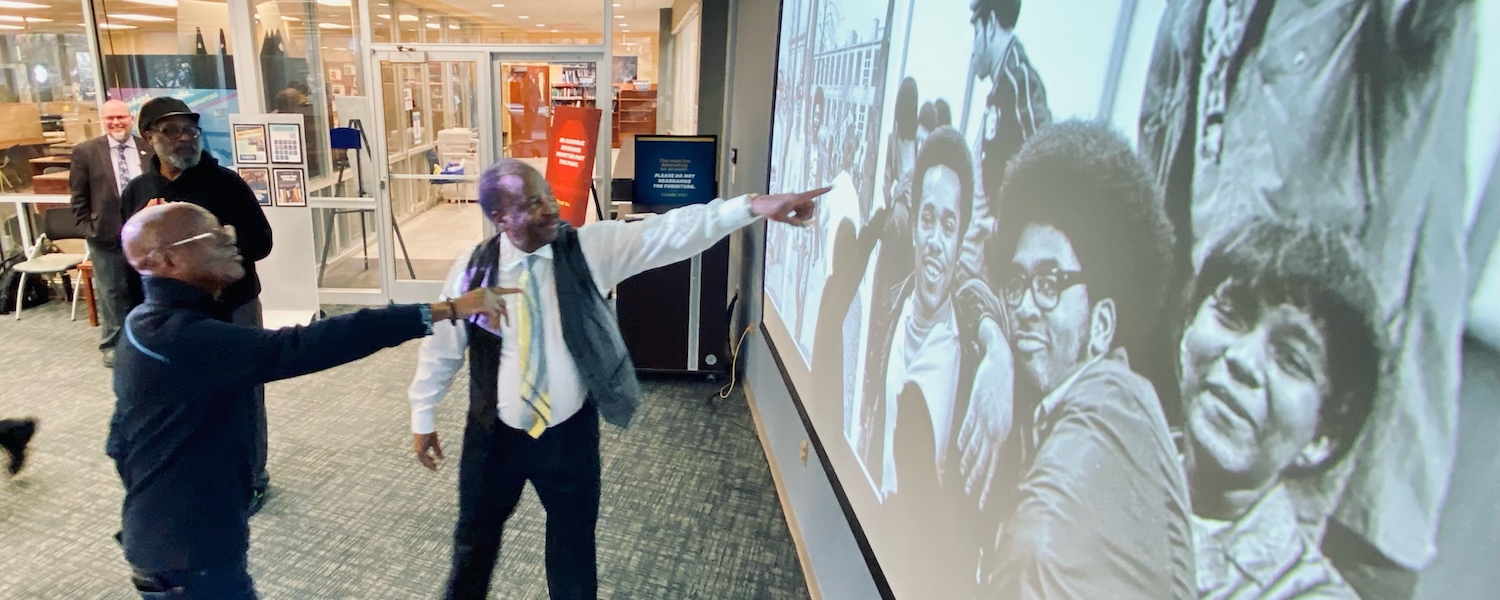More than 1,000 photos of Black student life have been digitized and are waiting for members of the şÚÁĎÍř community to help identify them.
A new world opened up to the şÚÁĎÍř community in January 2014, when Lafayette (Lafe) Edward Tolliver donated more than 1,000 pictures that he took depicting campus life from 1967-1971, particularly Black student life.

The photographs, now digitized, are available to anyone worldwide through University Libraries’ Special Collections and Archives.
Tolliver’s photographs — most of which had never been published or accessible to the public prior to the donation — are literal snapshots in time preserved in black and white during an era of great social change and political unrest. Yet many reflect a simple, joyful time of youth for their many subjects.
The photos provide the university and historians with beautiful images of students learning, engaging with speakers and performers, and demonstrating to fight for their rights and beliefs, but also just hanging out, having fun and enjoying the fellowship of Greek life.

Visual Footprints in Time
“Lafayette Tolliver: Visual Footprints in Time,” a collection of these photographs, will be on display through summer 2023 in University Libraries’ Marovitz Gallery, located on the first floor near the elevators. The goal is to generate interest in further exploration of Tolliver’s work, so that it can be widely shared beyond şÚÁĎÍř.
The library hosted a special event on Feb. 23 to thank Tolliver for his generosity, celebrate his photographs and ask for the şÚÁĎÍř community’s help.
“Yet, as we are at şÚÁĎÍř and it is Black History Month, an annual observance whose national origins trace back to its first observance here in 1970, due to the leadership of our Black United Students,” Ken Burhanna, professor and dean of University Libraries, said in his opening remarks. “Tonight is also about the legacy of Black history at şÚÁĎÍř.”

Mwatabu Okantah, professor and chair of the Department of Africana Studies, lived some of that legacy as a student. His first day as an undergraduate student was the first day şÚÁĎÍř reopened in 1970, following the May 4 shootings that left four students dead and nine injured. Okantah spoke about the importance of Tolliver’s work in capturing the life of students, especially Black students, at şÚÁĎÍř during that time.
Photos Reflect the Day’s Reality
Cara Gilgenbach, associate professor and head of Special Collections and Archives, whose team was responsible for digitizing and preserving the photos, introduced Tolliver at the event.
“He used his camera to record a visual footprint of Black student life at şÚÁĎÍř,” Gilgenbach said. ”This metaphor was the inspiration for our exhibition title. We are honored to welcome him back here tonight.”
Tolliver, who graduated from şÚÁĎÍř in 1971 with a bachelor of science degree in photojournalism, began his remarks by proudly showing off his cameras. If you saw him at şÚÁĎÍř during his time as an undergraduate, you saw a camera in his hand, Tolliver joked.

Tolliver said he hopes these photos demonstrate life on campus. “We were there. This is what we did, saw and how we acted.”
Tolliver’s philosophy of photography is “to make sure what you take is honest and factual,” and his images portray just that. His photos, mostly candid images of campus life, were intentionally not staged.
“Whatever you see,” he said, motioning to the slideshow of images behind him, “is what it was.”
Tolliver served as a photographer and columnist for the Chestnut Burr yearbook and the Daily şÚÁĎÍřr campus newspaper and also contributed to Black Watch, a monthly publication produced by Black United Students. Tolliver wrote editorials on issues he cared about in a Stater column titled "Basic Black," a sampling of which is included in the exhibit.

Tolliver also was an eyewitness to and documentarian of major campus events, including the mass Black student walkout in November 1968 and the 1970 shootings. After earning a Juris Doctor degree from the University of Toledo College of Law, Tolliver became a civil rights attorney in Toledo, Ohio, where he still resides.
Burhanna noted that the work in preserving and digitizing Tolliver’s photographs was “a new start for us in seeking to preserve and shine a light on that legacy,” noting that in recent years the library has made significant progress in digitizing 50 years of publications from Black United Students, Black Watch, the Spectrum and Uhuru publications.
Help Wanted
Giglenbach said members of the community can help continue the work by identifying and naming the people Lafayette photographed and providing the library with any publications, documents or photographs that can add to the story of the Black community at şÚÁĎÍř.

Anyone who may have information on identifications for the photos should contact and include a link to the photograph or the four or five-digit number that appears at the end of the image's link.
Before the event started, an impromptu identification session took place as Tolliver and his classmates, including Okantah and Professor Gene Shelton, started reminiscing minutes into greeting one another, proving the power of photographs to evoke memories.

